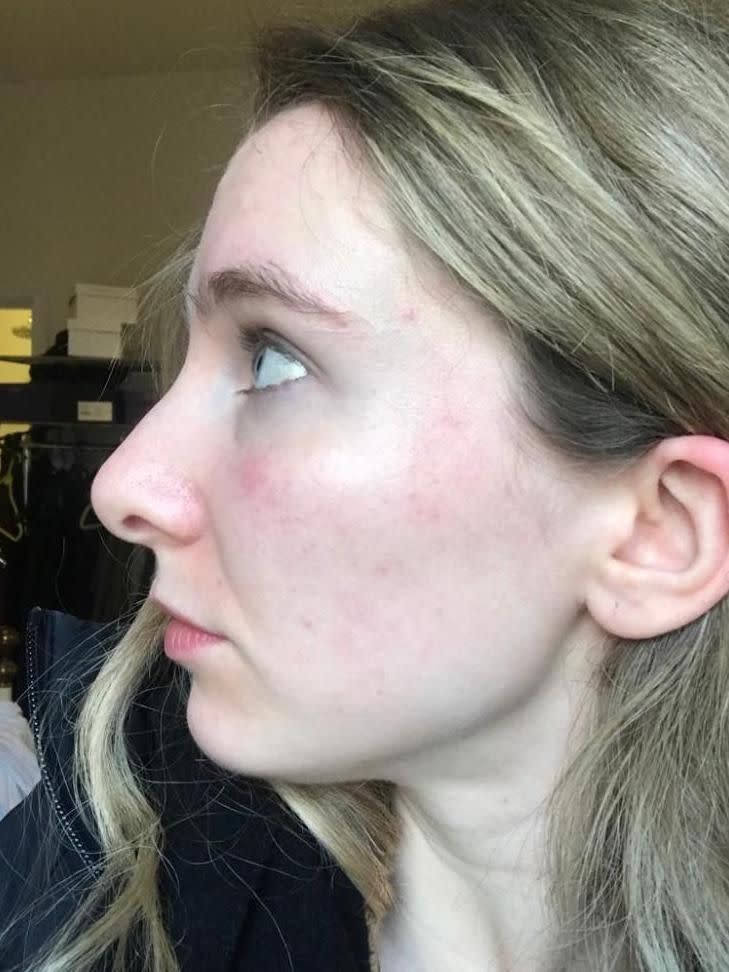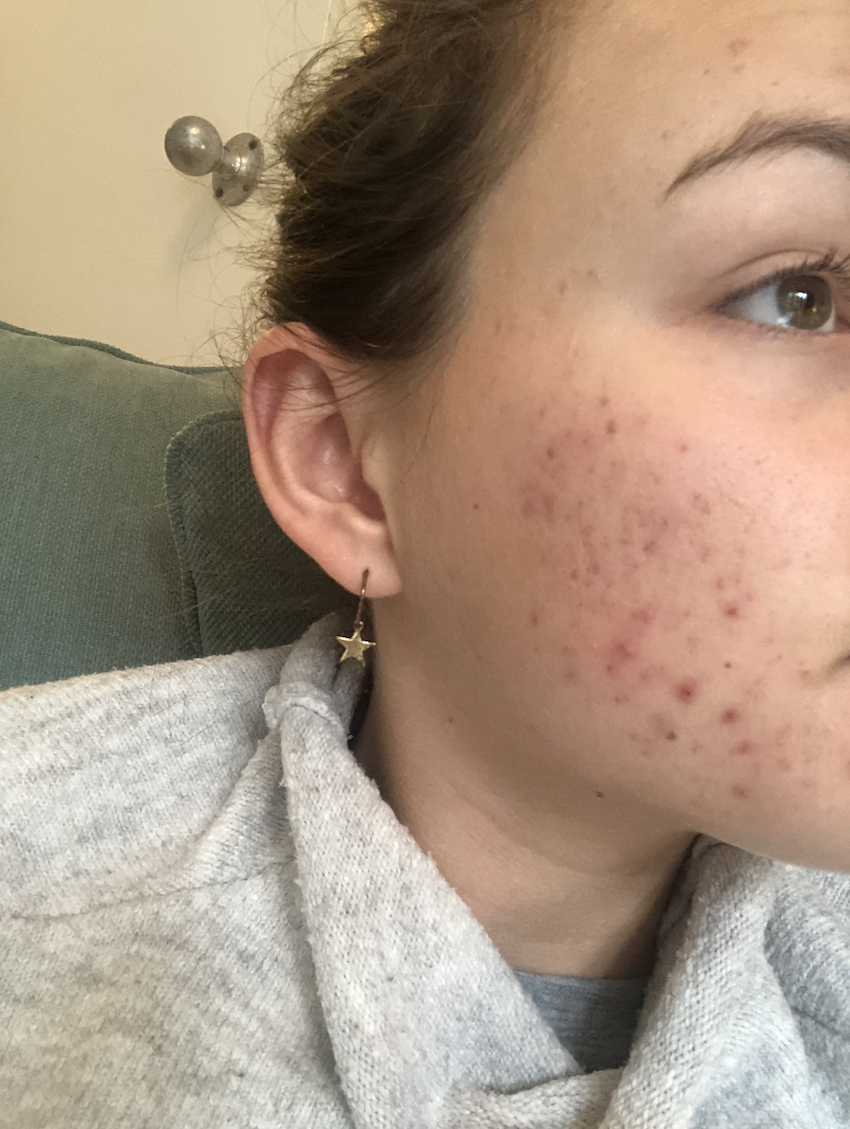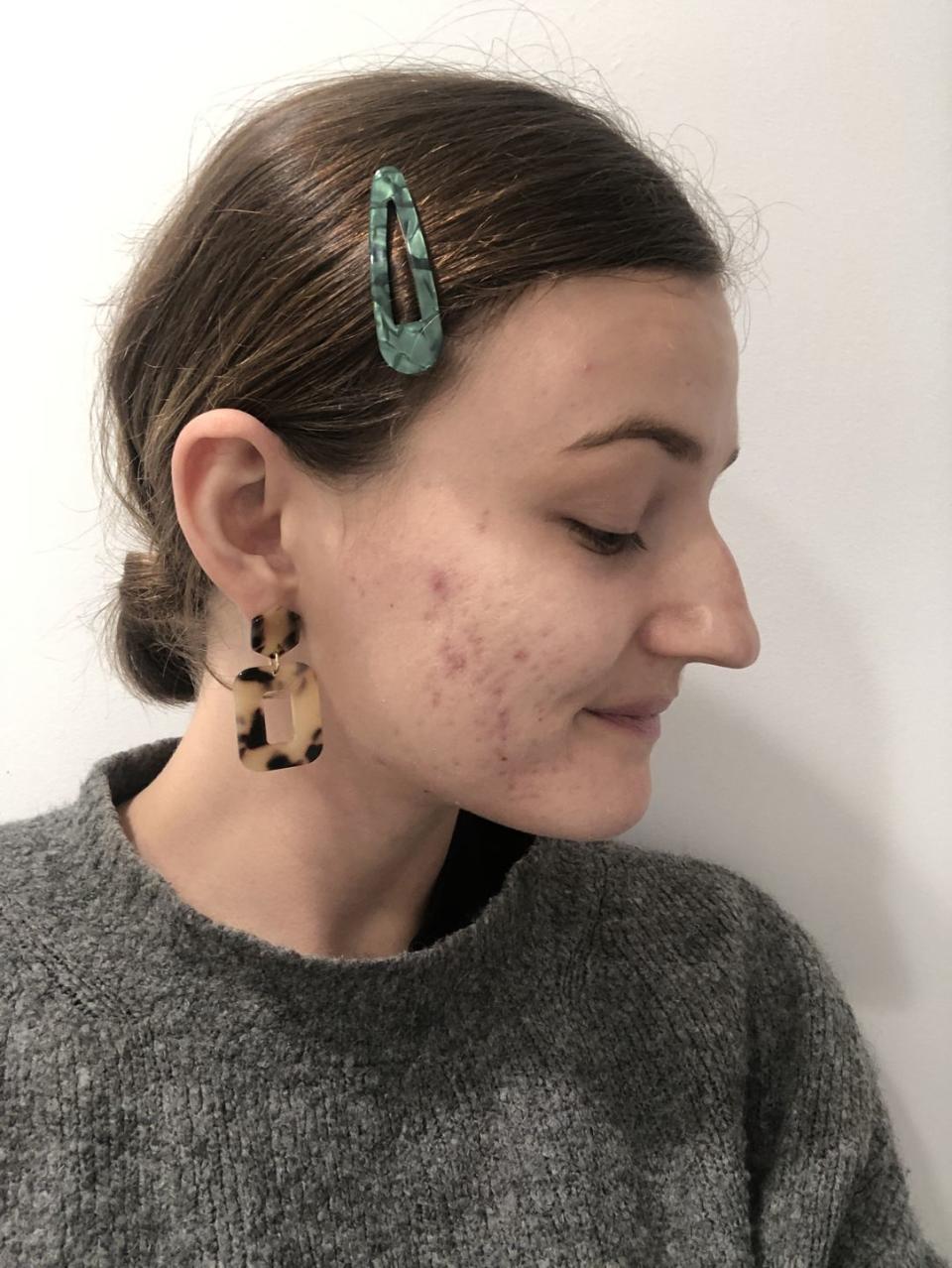Check out these before and after shots of using Benzoyl Peroxide for acne

You thought once you’d emerged from your teens and started wearing sunscreen on the regs (kudos) that your skin would just fall into line. But then you hit your late 20s or 30s and – and along with a sudden urge to have a Dyson in your life – you’re suddenly blessed with cystic pimples.
If your acne is making a comeback to rival bikini shorts then you’re not alone. A 2018 review of studies in the journal Clinical, Cosmetic and Investigational Dermatology reported a significant increase in adults dealing with the skin condition – stress, hormones and multi-layered skin regimes have been mooted as possible explanations.)
While acne treatments vary, one often recommended is of Benzoyl Peroxide. For those no au fait, it’s available in more gentle formulas as over-the-counter creams and face washes, as well as in higher does via prescription.
It's not quite as industrial as the controversial Roaccutane – but it does still come with some side effects that you should know about.
To that end, we cornered the leading skincare pros and asked them everything you would need to know before opting for this spot busting treatment.
Here's the low down on benzoyl peroxide.
What does Benzoyl Peroxide do you your face?
'Benzoyl Peroxide has been around for 40 odd years. It works by killing the bacteria that causes acne,' explains Dr. Vishal Madan, consultant dermatologist at Everything Skin Clinic. Effectively, it exfoliates your pores and encourages skin turnover, to get rid of the build-up of sebum and gunk in your buried inside them.
'The good thing is, the bacteria does not develop a resistance to it, as can be the case with the antibiotics which are sometimes used to treat acne,' Dr Madan adds.
That means that you can use it on and off for years, without it becoming ineffective.
When should you use Benzoyl Peroxide?
If you have mild acne, then it can be used as your only treatment, says Dr Madan. You can head into a pharmacy and pick up a gel that contains about 5% of the ingredient, (although you may need to fill in a health form or speak to a pharmacist to get these) or in the form of a face wash, with more like 2.5%.
If your acne is more severe, you might be prescribed it as one as part of a mix of other treatments, such as a topical retinoid. In this instance, you might have a formula that's up to 10%.
How long does Benzoyl Peroxide take to work?
'That depends how severe your acne is,' says Dr Madan. 'If your acne is mild, then it can take one to six weeks to dry out your spots. If your acne is more severe, then Benzoyl Peroxide alone is unlikely to be effective' – so it depends on what you're marrying it up with.
'Usually, recommended use is eight to twelve weeks, with some relief and results showing after two to three weeks, says dermatologist Dr Gary Goldfaden, of Goldfaden MD skincare.
You also need to factor in how you're using it. Some people use Benzoyl Peroxide as more of a maintenance thing to keep spots at bay – they might use a face wash that contains the substance two to three times a week – whereas others may be applying a higher strength topical gel to individual spots, as they're mid acne flare-up.
What are Benzoyl Peroxide's side effects?
So the side effects aren't so great. Long story short, Benzoyl Peroxide can really bother your skin. 'It cause the skin to be appear very red and irritated, as well as causing peeling and dryness,' says Dr Goldfaden.
As it does contain peroxide – which you may remember from turning your mousey hair blonde – it can have unwanted bleaching effects, such as causing patches of your skin to appear lighter. You should also note that it could bleach your sink, if you're standing over it to apply, or even your hair, if you touch your strands and your fingers have residue on them. Safe to say, you want to wash your hands thoroughly after applying the stuff.
Dr Goldfaden, to note, would recommend using a salicylic acid treatment over Benzoyl Peroxide. Why? 'It's less aggressive while delivering similar results.'
Dr Madan says it's important to take care to wear SPF (factor 30, minimum) when using the treatment, as it can cause your skin to be more sensitive to the sunlight.
Can I use Benzoyl Peroxide if I have rosacea or very sensitive skin?
This is a question to take to your doctor. But just because your skin is super sensitive doesn't mean that you can't use it. 'You can build up a tolerance to it, if you start with a very weak application and slowly scale up, using very small amounts,' Dr Madan elaborates. But make sure you're doing this with medical supervision.
Can I use Benzoyl Peroxide while pregnant?
Nope – just like with retinoids, you cannot use if you're expecting, as the chemicals could prove harmful to your foetus.
Do you have to wash off Benzoyl Peroxide?
Depends what you've been prescribed or have bought. A face wash will, of course, rinse right off, while some gels are designed to be left on for an hour and then rinsed away. Your pharmacist or doctor will fill you in.
Can Benzoyl Peroxide remove dark spots?
'Some people claim that Benzoyl peroxide can reduce the appearance of dark spots by accelerating the skin’s shedding' reveals Dr Sophie Shotter.
'This enhanced exfoliation effect however isn’t clinically proven, and in my opinion there are far better ways to treat dark spots. Benzoyl peroxide is very drying to the skin, and if over-used could in fact cause post inflammatory hyperpigmentation,' she adds.
Are there any skincare ingredients you should when using Benzoyl Peroxide?
'Avoid mixing benzoyl peroxide alongside retinol, as the two will make each other less effective. Look for gentle hydrating products to use alongside benzoyl peroxide as it can be very drying. The products should be non-comedogenic and might include hyaluronic acid or niacinamide, for example. SPF is also an essential when using benzoyl peroxide, as you will be more sun sensitive' reveals Dr Shotter.
What can you do if Benzoyl Peroxide does not work?
'You should speak to a dermatologist if your skin does not improve with benzoyl peroxide, or if acne is causing you to feel unhappy. There are plenty of treatments that can be discussed, however, each treatment should be determined on a case by case basis and should be tailored to you. You shouldn’t have to suffer in silence,' advises Consultant Dermatologist, Dr Hiba Injibar.
Dr Shotter adds, 'a dermatologist may also recommend combining the benzoyl peroxide with other acne-fighting products such as antibiotic gels, salicylic acid or prescription strength tretinoin (with caution). You could consider trying in clinic treatments like chemical peels, Hydrafacial or LED light therapy, or invest in a great home use device such as the LightStim which is a clinical grade LED available for acne treatment at home.'
Benzoyl Peroxide: before and after using the ingredient
Roisín Dervish O'Kane is Women's Health's Senior Editor.


I started using Benzoyl Peroxide after realising that my skin was massively getting me down a couple of years ago. I never had the sort of life-ruining cystic acne that some people deal with, but I had constant angry spots. I used to just get them on my T-zone but now they were all over my neck, cheeks and jawline as well.
I have a history of depression so always assumed that I wouldn’t be prescribed Roaccatane, and, anecdotally I’d always heard that anything topical or softer wouldn’t work.
I went to my NHS surgery in November 2018 not really expecting much. I tried to raise that I may have a hormonal imbalance and they didn't really take me on. Instead the doctor prescribed a topical Benzoyl Peroxide formulation.
I have rosacea and sensitive skin, so they suggested building up to nightly use. As instructed I’ve stopped using much else on my face. I cleanse first with micellar water and then a gentle cleanser and only wear Bea Skincare vitamin C and hyaluronic acid followed by an Ultrasun non-comodegenic SPF daily.
I used the formulation every other day and saw results within a month. Part of me wondered whether this was my skin clearing up because of the festive wind down and less stress, but January to March, my skin stayed clear. I’ve noticed that my rosacea has appeared worse but, on balance, I’m happier. I’d rather have a red face than a spotty one – especially as it’s easier to cover.
I’d recommend it, but with the caveats to go easy if you have sensitive skin and strip back the rest of your skincare routine.
Ally Head is a Women's Health contributor.

In 2018, I started to develop adult acne. Unsure as to what to do, I booked a GP appointment, thinking I would have to start round two of Roaccutane, which I had taken once before, as a teenager.
I wasn't super happy about that, as I knew all about the side effects – extreme facial peeling, dramatic mood swings and migraines – so when my doctor recommended I try Benzoyl Peroxide first, I was relieved. In essence, it’s a weaker and gel-form version of Roaccutane, so dries out oily skin without putting the pressure on your immune system. My GP warned that my skin would get dry—very dry—but to stick with it.
Warning: it does indeed dry your skin out, and, within a few days, my spots got worse and my cheeks got a little red. Plus, the gel made my skin slightly sensitive to sunlight (again, this is normal), so I made sure to wear a higher SPF every day.

Come week two and I was applying twice a day. Whilst this means you’ll experience a tighter-feeling face overall, it does mean you’ll see results more quickly.
I was prescribed the gel at the start of January 2019, and although my skin isn’t totally clear now and scarring does remain, at the end of March 2019, it is clearer than when I started using Benzoyl, and the dryness is gone. Plus, I don’t have new active spots growing, for the first time in about half a year.
4 best Benzoyl Peroxide products
1/ La Roche-Posay Effaclar Duo Dual Action Acne Treatment Cream
This teams BP with a lipo-hydroxy acid, which gently exfoliates the skin and purges pores. It's also a winner because it works as a localised treatment thanks to the high dose of BP, meaning you can target one off angry spots. A little also goes a long way, too.
2/ Paula's Choice CLEAR Regular Strength Skin Clearing Treatment
Formulated without harsh ingredients you won't get any of the skin peeling associated with some acne treatments. This lightweight lotion gets to work instantly on dialing down redness and fighting acne to prevent future breakouts. Simply use everyday after cleansing.
3/ Acnecide 5% Gel Benzoyl Peroxide
As well as containing 5% BP, this gel also has microsphere technology which helps absorb excess oil while releasing glycerine to offer a hit of hydration to this skin. Use on your back, face and chest.
4/ Glo Skin Clear Skin Spot Treatment
Another brilliant gel product that helps to clear up skin in days thats to 5% BP. Be sure to use an SPF alongside it as BP can increase skin sensitivity.
Cut through the noise and get practical, expert advice, home workouts, easy nutrition and more direct to your inbox. Sign up to the WOMEN'S HEALTH NEWSLETTER
You Might Also Like


